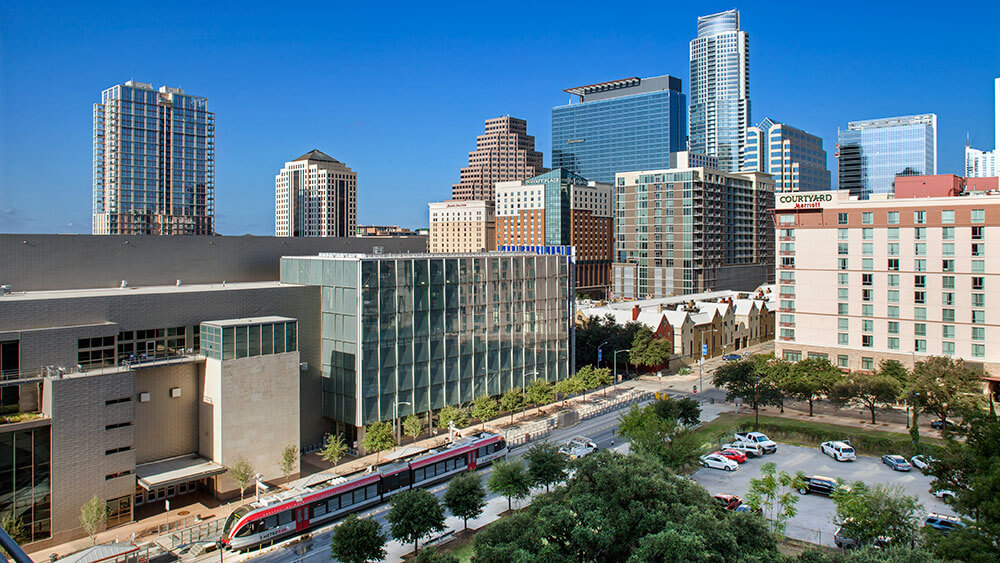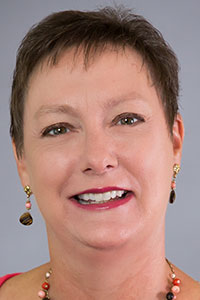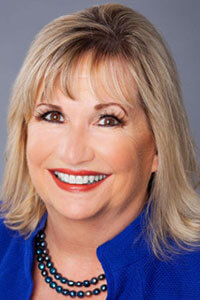
Organizers of at least four conferences have canceled the events in Austin because of the lack of a statewide mask mandate, the Texas Tribune reports. (Thomas McConnell photo)
One new question Convene asked in this month’s Recovery Dashboard Survey — asking when organizers are making the go/no go decision about in-person events in 2021 — elicited this open-ended response from a planner: “We are past go/no go. We are only contracting meetings in Republican states. … As long as the state allows us in, we are there.”
But not every group shares this planner’s political bent. The lack of a statewide mask mandate in the Republican state of Texas has led to the cancellation of at least four in-person conferences that had been scheduled for Austin, according to a recent Texas Tribune article. “These were rooms that were already on the books, and largely what we saw was fallout, ironically, from the governor opening the economy,” Hilton Austin’s general manager, Joe Bolash, said during a March 16 Austin Convention Enterprises board meeting. (Austin Convention Enterprises is the city-owned entity that owns and manages the hotel.) “It was groups that were not comfortable returning to a fully opened economy,” he said, “where there was no mask mandate in place.”
Three of the lost events in Austin “had relationships in the medical field,” Bolash told Texas Tribune. But even when there are mask mandates in place by the local government and/or the host venue, enforcing that policy still can become problematic, depending on the group convening. That was spotlighted in the Feb. 25-28 Conservative Political Action Conference (CPAC) program, when Carly Patrick — one of the event’s organizers — urged the audience to don their face masks at the Hyatt Regency Orlando.
“We are in a private facility, and we do want to be respectful of the ordinances that they have as their private property,” Patrick told the crowd. “So please, everyone, when you’re in the ballroom, when you’re seated, you should still be wearing a mask. So, if everybody can go ahead, and work on that.”
RELATED: Can Venues Have a Say in Event Set Design?
Not many seemed to want to do that work, judging by the video that made the rounds on national news of attendees booing and shouting “Freedom!” in response to her request. The scene put Hyatt in the uncomfortable position of issuing a press release to highlight the challenges the property faced in its efforts to follow the law.
“In keeping with our deep culture of inclusivity, our colleagues worked tirelessly to support this event while enforcing Hyatt’s safety policies,” the hotelier said in a statement about the event. “At times, these efforts included reminding attendees to wear masks and socially distance, even while colleagues occasionally faced hostility from attendees who did not support our policies. While individuals are entitled to their opinions, in a Hyatt hotel we expect guests to follow our policies.”
CPAC may be the first public example of the challenges inherent in implementing new policies shaped by the pandemic at an event, but it will likely not be the last. According to a recent study conducted by the University of Southern California’s Dornsife Center for Economic and Social Research, only 47 percent of people said they wore a mask when they were with 10 or more people at an event. Now, conference organizers and venues focused on bringing face-to-face events back while keeping the virus in check face a looming question: Who’s responsible for telling attendees to cover their noses and mouths, stay six feet apart, and do their part to stop the spread?

Tyra Warner
Navigating New Contract Language and Local Laws
Tyra Warner, Ph.D., JD, CMP, attorney and professor at the College of Coastal Georgia, told Convene that she is already seeing organizers and venues insert language about responsibilities for on-site behavior into contracts.
“Event organizers want to confirm that the venue is adhering to certain cleaning standards and allowing for room sets that meet social-distancing guidelines,” Warner said. “And if the state or county where the venue is located has ordinances in place for procedures and policies about mask use, the venue is making sure that the group agrees to follow them.”
Those policies depend largely on where an event is held. Warner said that some states are taking steps that dramatically reduce any risks for businesses — which include venues. For example, Georgia’s COVID-19 Pandemic Business Safety Act essentially eliminates liability for businesses as long as they post a sign (with one-inch Arial font) indicating that the customer assumes all risks of contracting the virus by entering the building.
RELATED: Ensuring Compliance During COVID at In-Person Events
As states begin to roll back mask requirements and capacity restrictions, regulating the behavior of attendees and exhibitors will present a bigger challenge. “Policies are much harder to enforce if the state or county doesn’t have a mask mandate,” Warner said. “The group certainly has the right to say, ‘You’re here at our pleasure, and if you’re not going to adhere to our policies, we will have to ask you to leave.’”
Realistically, though, asking participants to leave puts organizers in a difficult position, she pointed out. “This is something that groups are struggling with,” Warner said. “They want to make it as safe as possible, but if you have members who don’t want to wear a mask or get the vaccine, they might say you are treating them unfairly.”
Back to the Basics
The key to a post-pandemic recovery relies on two aspects of a successful relationship between organizers and venues: collaboration and communication. Lisa Sommer Devlin, a hospitality lawyer at Arizona-based Devlin Law Firm, recommends organizers and venues work together on an event-by-event basis to articulate a policy about behavior. More importantly, that policy needs to be communicated well in advance to participants and should be something they agree to when they register.

Mark Cooper
It’s not just about email messages prior to the opening session, though. Mark Cooper, CEO of the International Association of Conference Centres (IACC), told Convene the on-site environment needs to provide plenty of reminders, too.
“The vehicles used for communicating information to attendees are vital, in that there must be visibility and then reinforcement of messages and information to attendees throughout the event,” Cooper said. “The conference app is one that can be used effectively before and during an event to send messages to attendees. Speakers [reinforcing that messaging] are another. Finally, any show of unity between the venue and the event group is important. We are here to make the environment a safe and comfortable one for staff and attendees collectively.”
Having a policy — if you refuse to wear a mask, you will need to leave, for example — is one thing, but Sommer Devlin said it’s equally important to know who is going to enforce it on-site. She thinks it may be wise to consider hiring outside security staff in identifiable clothing who can politely tap someone who isn’t wearing a mask on the shoulder and hand them the written policy.
“You have to decide who’s going to police it,” Sommer Devlin said. “I think it’s a bad idea for volunteers to enforce it because some of these requirements are political and difficult.”
Post-Event Responsibilities
What about after the event? If an attendee is diagnosed with COVID after he or she leaves, is the event organizer responsible for letting others know? Sommer Devlin believes this is a particularly gray area. “Just because someone has COVID,” she said, “it doesn’t mean they got it at the event or that they spread it to other attendees. What if they got it on the way to the airport?”

Lisa Sommer Devlin
Consider Sommer Devlin’s analogy to everyday interactions: If someone goes to a café and contracts COVID, does the café have to tell everyone? She doesn’t believe the law would require that obligation, and she believe it carries over to the events industry. “Event professionals are not scientists or epidemiologists,” Sommer Devlin said. “They are not in the position to make those calls.”
There may be no legal precedent for reporting possible exposure, but Warner believes that organizers and venues share “a public health responsibility” to inform participants. “I think there is an obligation to inform them,” Warner said. “How the law will handle that, I’m not entirely sure, but it’s a pretty low bar to just be transparent with people.”
Warner added that the organizers should expect to share any information with the venue in order to pass the word along to other guests. For example, if the group finds out that an attendee has tested positive for the virus, Warner said someone at the group should be prepared to immediately let the venue know. “Events don’t happen in a vacuum,” Warner said. “Attendees are in restaurants and elevators, crossing paths with other guests.”
As groups work to sift through policies, Cooper said, the events industry needs to follow the data, and it will take time for that data to shape appropriate policies. “COVID-19 is not weakened by defiance and determination,” he said. “We know the route to recovery, but we are not in control of the accelerator pedal.”

Mask mandates at events should be shared by all entities, some experts say. (Adobe Stock)
Going Above and Beyond: Assuming More Responsibility
IACC’s Mark Cooper said that there are three forces in play for the post-pandemic template for safety: government legislation, a venue’s policy, and the policy imposed by the group. If a group wants to add more protection above the standard of the state or venue, Cooper said it’s up to the organizer to manage it.
“In circumstances where the organizer wishes to impose a voluntary measure to safeguard their group further, then the venue should make it clear that this is to be managed by the organizer and that potentially, there may be other groups in the venue whose attendees are following different guidelines,” Cooper said. “It could confuse attendees of all groups otherwise, so clearly communicated procedures are critical.”
A word of caution for organizers who decide to add more protection than the government or the venue owner: Doing so can create more liability issues.
“I always admire customers working so hard to be extra safe,” attorney Lisa Sommer Devlin said, “but there is a concept in the law called ‘assuming a duty.’ What that means is that you may not be responsible for something, but once you take on the responsibility, if you don’t do it right, you may be liable.
“If you start setting the standards for safety,” she added, “someone can say that you didn’t do enough.”
WEBINAR ALERT
Please join our panel of industry experts for a discussion about “Pandemic Protocol: Who’s Responsible for Enforcing Event Safety?” Register for the April 8 webinar.
David McMillin is a former Convene associate editor and freelance writer based in Chicago. Michelle Russell is editor in chief of Convene.
